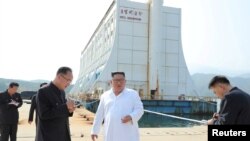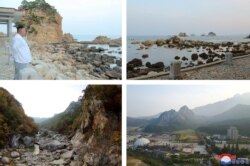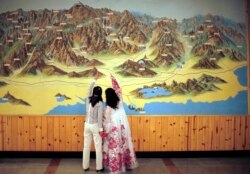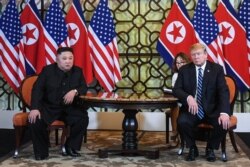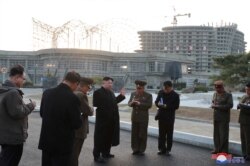North Korean leader Kim Jong Un’s order to demolish the South Korean-built resort of Mount Kumgang in North Korea’s northeastern tourism spot is seen as an attempt to pressure Seoul to defy international sanctions to resume inter-Korean projects.
Kim is “trying to put domestic political pressure on [South Korean President] Moon Jae-in to break sanctions,” said Joshua Stanton, a Washington-based attorney who helped draft the North Korean Sanctions Enforcement Act in 2016.
Stanton said the only thing Moon can claim as a political accomplishment is the improvement of relations with North Korea, because the economy in South Korea is bad, with the declining rate of growth and rising rate of unemployment.
“This is Kim Jong Un’s way of saying that if you don’t comply with my demands, I will deny you this last thing that you can claim as an achievement,” he said.
Since Moon began Seoul’s diplomatic overtures with Pyongyang in 2018, he has been pushing for improving inter-Korean ties and resuming inter-Korean projects, including Mount Kumgang tourism that Kim has been eager to begin as it could become a key source of income for his cash-strapped country.
But Seoul’s attempts to restart inter-Korean projects were never realized, mostly because of Washington’s reluctance to lift international sanctions, including the ones that ban setting up joint entities with North Korea that could help Pyongyang make foreign income to fund its nuclear weapons programs.
‘Shabby’
North Korean state media Korea Central News Agency (KCNA) said Wednesday that Kim has instructed South Korean-built resort facilities on Mount Kumgang to be taken down so that they can be built again because they are “shabby” and “unpleasant-looking.”
Kim said North Korea’s policies under his late father, Kim Jong Il, were too dependent on South Korea and vowed that North Korea would redevelop the site on its own, according to the KCNA.
On Friday, Seoul said Pyongyang sent a letter through the inter-Korean liaison office in Kaesong demanding the South Korean government and Hyundai business group, which funded the development of the resort in North Korea, remove the facilities.
Symbol of cooperation
Mount Kumgang, also known as Diamond Mountain, has been a symbol of inter-Korean cooperation since tours began in 1998. The resort closed in 2008 after a North Korean guard fatally shot a South Korean tourist.
While speaking to the press Friday, Moon signaled a new approach may be necessary to resume Mount Kumgang tourism because following “the existing method” of the inter-Korean project at the tourist resort is difficult because of sanctions.
Ken Gause, director of the Adversary Analytics Program at CNA, said Kim’s frustration with sanctions that Seoul will not defy and that Washington will not lift has prompted him to send “a strategic signaling” through his call for the removal of the resort.
“To the U.S., it is basically saying, ‘Look, we’re beginning to move away from the whole idea of diplomacy,’” Gause said. “This is a way, I think, of trying to put pressure on South Korea as well as the United States to really alert them that things are getting ready to change and time is running out.”
Washington and Pyongyang’s working-level talks in Stockholm earlier this month broke down, apparently because they were unable to reach a compromise on denuclearization and sanctions relief.
At the Hanoi Summit in February, Kim demanded the U.S. lift sanctions in exchange for a partial denuclearization, an offer President Donald Trump denied and, instead, asked North Korea for full denuclearization. The U.S. said sanctions would remain in place after the Stockholm talks.
Joshua Pollack, an expert on North Korea at the Middlebury Institute of International Studies in California, said Kim’s instruction to tear down and rebuild Kumgang resort appears to be an “indication that he has given up on sanctions relief for the time being.” He continued, “He seems determined to find new sources of income” through tourism.
Recreational resort plans
In August, Kim traveled to the Wonsan-Kalma tourist area on the country’s eastern coast and called on “everybody to build the sea park without an equal in the world,” according to the KCNA, which added that building the recreational resort on the shores of North Korea is Kim’s long-desired wish.
In an apparent move to induce Kim to give up his nuclear weapons program and open up the country to the world, Trump attempted to suggest to Kim that he could have a different future by showing him a video depicting a prosperous North Korea at the Singapore Summit in 2018. At the press conference after the summit, Trump said North Korea has “great beaches” to build condos and hotels.
According to South Korean newspaper Hankook Ilbo, the U.S. proposed plans to help North Korea build the Wonsan-Kalma resort area at the Stockholm working-level talks, citing a South Korean official familiar with the talks.
Troy Stangarone, a senior director at the Korea Economic Institute, said, “It is unlikely that this is an actual proposal floated by the United States.”
“This would require the United States to provide support that is prohibited under U.S. law, and those prohibitions cannot be waived by the administration,” Stangarone said. “It is unlikely that Kim’s order [to destroy the resort] is related to this.”
While international sanctions do not ban North Korean tourism, they prohibit setting up joint ventures with North Korea. And the U.S. prohibits investment projects in North Korea under the North Korea Sanctions and Policy Enhancement Act of 2016, Stanton said.
He added, however, “Until I see the administration denying it, I think it’s plausible, and it’s consistent with some other things that Donald Trump has said.”
‘Area of potential support’
Bradley Babson, an advisory council member of the Korea Economic Institute of America, said the U.S. may be suggesting to help build resorts “as an area of potential support for them.”
Babson, nevertheless, does not think helping Pyongyang build a resort will solve its economic problems. He said although tourism is a “fairly low-cost way of earning foreign exchange,” economic gains North Korea could make from tourism are “pretty marginal.”
Gause said plans to help North Korea develop its economy, whether through resorts or other means, is only possible after North Korea reforms and joins the international community.
“In the future, maybe if [the North Koreans] are able to connect with the outside world, develop laws and regulations in terms of economic finance and trade, then maybe you could trust them more to have a place where you could actually do some investment,” Gause said.
Robert Manning, a senior fellow at the Atlantic Council, said, “Kim doesn’t want ‘reform-and-opening’ type of policies.”
The North Koreans “are not going to give up their nukes for beach resorts. The point is that Kim views such offers as poison carrots that could threaten his regime,” he said.




